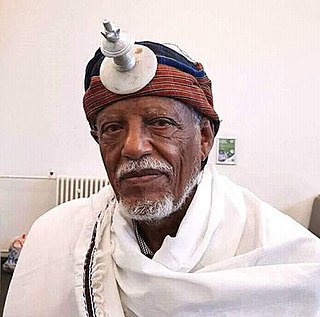Related Research Articles

Cultural anthropology is a branch of anthropology focused on the study of cultural variation among humans. It is in contrast to social anthropology, which perceives cultural variation as a subset of a posited anthropological constant. The term sociocultural anthropology includes both cultural and social anthropology traditions.
An incest taboo is any cultural rule or norm that prohibits sexual relations between certain members of the same family, mainly between individuals related by blood. All human cultures have norms that exclude certain close relatives from those considered suitable or permissible sexual or marriage partners, making such relationships taboo. However, different norms exist among cultures as to which blood relations are permissible as sexual partners and which are not. Sexual relations between related persons which are subject to the taboo are called incestuous relationships.

In anthropology, kinship is the web of social relationships that form an important part of the lives of all humans in all societies, although its exact meanings even within this discipline are often debated. Anthropologist Robin Fox says that the study of kinship is the study of what humans do with these basic facts of life – mating, gestation, parenthood, socialization, siblingship etc. Human society is unique, he argues, in that we are "working with the same raw material as exists in the animal world, but [we] can conceptualize and categorize it to serve social ends." These social ends include the socialization of children and the formation of basic economic, political and religious groups.

Structural functionalism, or simply functionalism, is "a framework for building theory that sees society as a complex system whose parts work together to promote solidarity and stability".
Ambilineality is a form of kinship affiliation of cognatic descent that relies on self-defined affiliation within a given social system, meaning individuals have the choice to be affiliated with their mother's or father's group. Common features of societies that practice ambilineality are a shared set of land, communal responsibilities, and collective ownership of some segments of wealth and debt in their societies. This system of descent is distinct from more common genealogical structures in that rather than determining affiliation and descent using the standard determinants of biological and genealogical relation, it instead relies heavily on voluntary affiliation with one's group, oftentimes being determined by factors including residence.
Sociocultural anthropology is a term used to refer to social anthropology and cultural anthropology together. It is one of the four main branches of anthropology. Sociocultural anthropologists focus on the study of society and culture, while often interested in cultural diversity and universalism.
Fictive kinship is a term used by anthropologists and ethnographers to describe forms of kinship or social ties that are based on neither consanguineal nor affinal ties. It contrasts with true kinship ties.
In anthropology, an age set is a social category or corporate social group, consisting of people of similar age, who have a common identity, maintain close ties over a prolonged period, and together pass through a series of age-related statuses. This is in contrast to an age grade, through which people pass individually over time.

Gadaa is the indigenous democratic system of governance used by the Oromos in Ethiopia and northern Kenya. It is also practiced by the Konso and Gedeo people of southern Ethiopia. The system regulates political, economic, social and religious activities of the community.

The sociology of culture, and the related cultural sociology, concerns the systematic analysis of culture, usually understood as the ensemble of symbolic codes used by a member of a society, as it is manifested in the society. For Georg Simmel, culture referred to "the cultivation of individuals through the agency of external forms which have been objectified in the course of history". Culture in the sociological field is analyzed as the ways of thinking and describing, acting, and the material objects that together shape a group of people's way of life.
Kinship terminology is the system used in languages to refer to the persons to whom an individual is related through kinship. Different societies classify kinship relations differently and therefore use different systems of kinship terminology; for example, some languages distinguish between consanguine and affinal uncles, whereas others have only one word to refer to both a father and his brothers. Kinship terminologies include the terms of address used in different languages or communities for different relatives and the terms of reference used to identify the relationship of these relatives to ego or to each other.
Educational capital refers to educational goods that are converted into commodities to be bought, sold, withheld, traded, consumed, and profited from in the educational system. Educational capital can be utilized to produce or reproduce inequality, and it can also serve as a leveling mechanism that fosters social justice and equal opportunity. Educational capital has been the focus of study in Economic anthropology, which provides a framework for understanding educational capital in its endeavor to understand human economic behavior using the tools of both economics and anthropology.
The origins of society — the evolutionary emergence of distinctively human social organization — is an important topic within evolutionary biology, anthropology, prehistory and palaeolithic archaeology. While little is known for certain, debates since Hobbes and Rousseau have returned again and again to the philosophical, moral and evolutionary questions posed.
Social anthropology is the study of patterns of behaviour in human societies and cultures. It is the dominant constituent of anthropology throughout the United Kingdom and much of Europe, where it is distinguished from cultural anthropology. In the United States, social anthropology is commonly subsumed within cultural anthropology or sociocultural anthropology.

In anthropology, a house society is a society where kinship and political relations are organized around membership in corporately-organized dwellings rather than around descent groups or lineages, as in the "House of Windsor". The concept was originally proposed by Claude Lévi-Strauss who called them "sociétés à maison". The concept has been applied to understand the organization of societies from Mesoamerica and the Moluccas to North Africa and medieval Europe.

Systems of Consanguinity and Affinity of the Human Family is an 1871 book written by Lewis Henry Morgan and published by the Smithsonian Institution. It is considered foundational for the discipline of anthropology and particularly for the study of human kinship. It was the culmination of decades of research into the variety of kinship terminologies in the world conducted partly through fieldwork and partly through a global survey of kinship terminologies in the languages and cultures of the world.
Detailed anthropological and sociological studies have been made about customs of patrilineal inheritance, where only male children can inherit. Some cultures also employ matrilineal succession, where property can only pass along the female line, most commonly going to the sister's sons of the decedent; but also, in some societies, from the mother to her daughters. Some ancient societies and most modern states employ egalitarian inheritance, without discrimination based on gender and/or birth order.

American anthropology has culture as its central and unifying concept. This most commonly refers to the universal human capacity to classify and encode human experiences symbolically, and to communicate symbolically encoded experiences socially. American anthropology is organized into four fields, each of which plays an important role in research on culture:
- biological anthropology
- linguistic anthropology
- cultural anthropology
- archaeology

Primate sociality is an area of primatology that aims to study the interactions between three main elements of a primate social network: the social organisation, the social structure and the mating system. The intersection of these three structures describe the socially complex behaviours and relationships occurring among adult males and females of a particular species. Cohesion and stability of groups are maintained through a confluence of factors, including: kinship, willingness to cooperate, frequency of agonistic behaviour, or varying intensities of dominance structures.

Customary laws, in line with official state laws, are based on age-old community customs and norms in Ethiopia. They are noticeable in regional states and become influential in the life of people more than the formal legal system. For example, in Amhara Region, they are called "Shemagelle", in Tigray "Bayito" and "Abo Gereb", and "Luba Basa" in Oromia.
References
- ↑ "Understand Gadaa System". Archived from the original on 2006-10-22. Retrieved 2006-10-12.
- ↑ Bernardi, B. (1985). Age Class Systems: Social Institutions and Polities Based on Age. Cambridge University Press.
- ↑ Shepherd, J.R. (1995). Marriage and Mandatory Abortion among the 17th-century Siraya. American Anthropological Association.